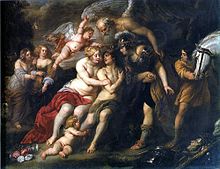Kakia

Kakia (Ancient Greek: Κακία, lit. 'malice, wickedness')[1] is the Greek goddess of vice and moral badness, abominations (presumably, sin or crime). She was depicted as a vain, plump, and heavily made-up woman dressed in revealing clothes, and was presented as the opposite of Arete, goddess of excellence and virtue.
According to Gnostics, Kakia is believed to be the child of the first angel and Authadia. Her siblings were Zelos (emulation), Phthonus (envy), Erinnys (fury), and Epithymia (lust).[2]
Kakia tried to tempt many people to become evil, but her most famous temptation was that of Heracles (a.k.a. Hercules), one of the most famous divine heroes in Greek mythology. She offered him a pleasant and easy life, devoid of hardships whereas Arete offered a glorious life but where work and effort would be needed.[3][4] Heracles saw Kakia's true colours when she revealed her name and thus the meaning of it in the below conversation:
You shall have the fruits of others' toil, and refrain from nothing that can bring you gain. For to my companions I give authority to pluck advantage where they will."
Now when Heracles heard this, he asked, "Lady, pray what is your name?"
"My friends call me Happiness," she said, "but among those that hate me I am nicknamed Kakia.—Excerpt from Xenophon, Memorabilia 2.1.25-26 telling of her competition with Arete to sway Heracles to her side (evil).
See also -Hercules at crossroads
Mentions of evil, wickedness, depravity, malice in the New Testament
[edit]- Matthew 6:34
- Acts 8:22
- Romans 1:29
- 1 Corinthians 5:8
- 1 Corinthians 14:20
- Ephesians 4:31
- Colossians 3:8
- Titus 3:3
- James 1:21
- 1 Peter 2:1
- 1 Peter 2:16
References
[edit]- ^ "Kakia Meaning in Bible - New Testament Grek Lexicon - New American Standard". biblestudytools.com. Retrieved 2022-10-12.
- ^ "Ante-Nicene Fathers, Vol I: IRENÆUS: Chapter XXIX.—Doctrines of various..." www.sacred-texts.com. Retrieved 2022-10-12.
- ^ "CACIA (Kakia) - Greek Goddess or Spirit of Vice". www.theoi.com. Retrieved 2022-10-12.
- ^ The Memorabilia of Xenophon: Book II. ISBN 0267503490.
